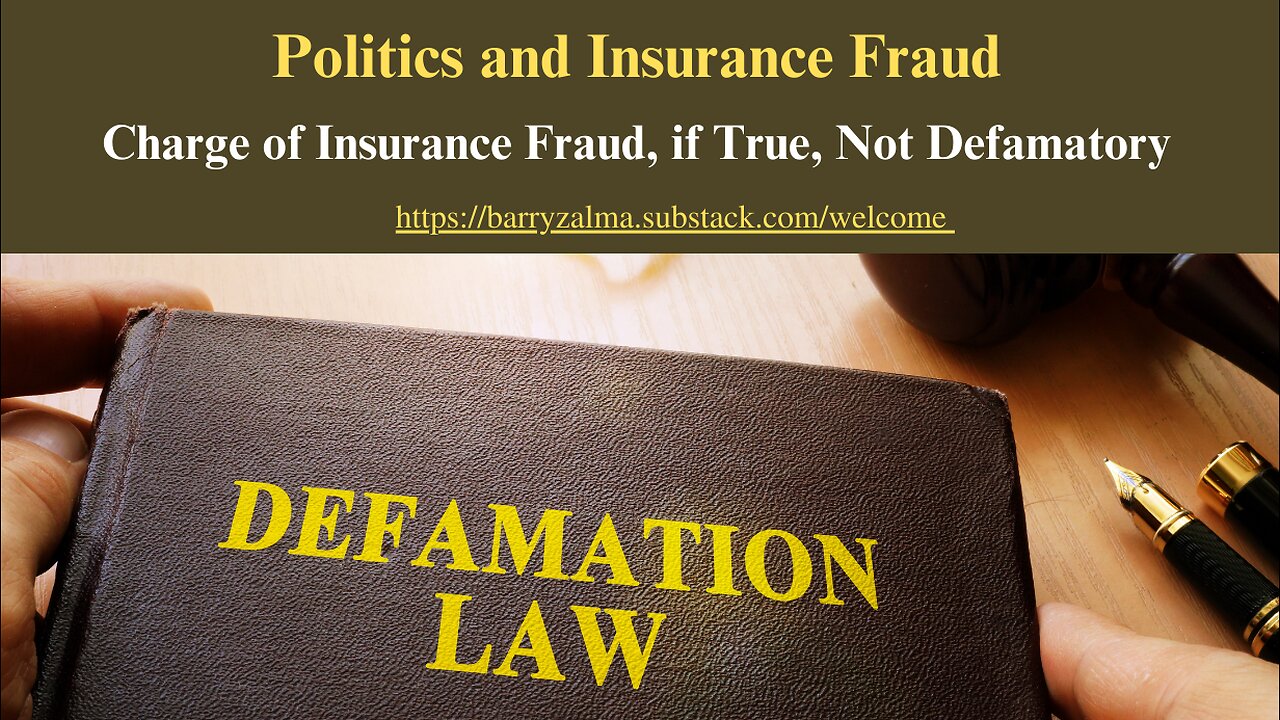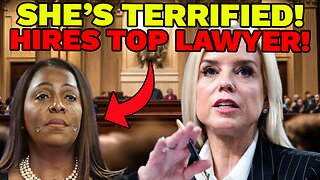Premium Only Content

Politics and Insurance Fraud
Charge of Insurance Fraud, if True, Not Defamatory
In RMS Insurance Services, Inc., d/b/a Flanders Insurance Agency, and Owen G. Costanza, an Individual v. Donald G. Sattler, an Individual, Marion L. Thornberry, an Individual, Elisabeth M. Rodgers, an Individual, and Cheryl Russell-Smith, an Individual, No. 4-23-0143, 2023 IL App (4th) 230143-U, Court of Appeals of Illinois, Fourth District (October 17, 2023) a suit claim of defamation by a politician failed.
THE SUIT
Plaintiffs RMS Insurance Services, Inc., d/b/a Flanders Insurance Agency (Flanders), and Owen G. Costanza, in his individual capacity, filed a 17-count complaint against defendants Donald G. Sattler, Marion L. Thornberry, Elisabeth M. Rodgers, and Cheryl Russell-Smith. Defendants Sattler, Thornberry, and Rodgers filed a motion for summary judgment asking the court to dismiss plaintiffs' first amended complaint with prejudice the court granted defendants' motions and dismissed plaintiffs' entire amended complaint with prejudice.
BACKGROUND
According to plaintiffs' complaint, Costanza was the former president of the Village of Poplar Grove. During the 2020 election, Sattler ran against Costanza for the office of village president. Costanza was the incumbent village president at that time. The complaint outlined animosity that existed between Costanza and defendants prior to and after the election.
Plaintiffs alleged defendants made defamatory statements about Costanza including accusations Costanza committed criminal acts, including insurance fraud. Sattler defeated Costanza in the election. However, plaintiffs alleged defendants continued to post the allegations against Costanza after the election was over.
The trial court (Judge Stephen E. Balogh presiding) found plaintiffs alleged the three defendants wanted to ruin Costanza's career in local politics. The crux of the defendants' motion for summary judgment is that their statements are all privileged because those statements are indisputably, materially and substantially true.
Under Illinois law, recovery for a defamatory statement in this case will only be allowed if there is a showing of actual malice. This requires proof by the plaintiff that has established both that the utterance was false and that it was made with knowledge of its falsity or in reckless disregard of whether it was false or true.
The trial court indicated it was undisputed that Costanza had been accused of, administratively disciplined for, and fired for committing fraud in the general sense of the word while working in the insurance industry. Costanza had a misdemeanor criminal record and has engaged in fraud, as that term is generally understood, in his work as an insurance professional.
ANALYSIS
When a party moving for summary judgment supplies facts which, if not contradicted, would entitle the moving party to a judgment as a matter of law, the nonmoving party may not rely on his pleadings alone to raise issues of material fact.
A plaintiff must present a factual basis that would arguably entitle the plaintiff to a judgment.
Applicable Law
To state a defamation claim, a plaintiff must present facts showing that the defendant made a false statement about the plaintiff, that the defendant made an unprivileged publication of that statement to a third party, and that this publication caused damages.
Qualified Privilege
Even if a statement is defamatory, the statement cannot support a defamation claim if it is true. Regardless, even if a defamatory statement is not substantially true, the statement is not actionable if protected by a qualified privilege. Courts must look at the alleged defamatory statements in context, giving the words of the statement, and any implications arising from them, their natural and obvious meaning.
The Court of Appeal concluded that the plaintiffs failed to establish the trial court erred in examining all of the statements made in the flyer.
The foundation for all of plaintiffs' claims in their amended complaint was defendants' alleged defamation. As a result, defendants' motion for summary judgment challenged all of plaintiffs' claims. Plaintiffs failed to establish the trial court erred in granting defendants' motion for summary judgment as to the entire amended complaint.
ZALMA OPINION
Accusing a person of the crime of insurance fraud is per se defamatory. However, if, as in this case, the charge is true the defamation charge fails. Costanza was not convicted of the crime of insurance fraud but lost his license to act as an insurance agent as a result of insurance fraud and was disciplined for the acts. Since the charge was true there was no way for Costanza to succeed in his defamation suit. Politics, Mr. Costanza, learned is a dirty game and will succeed if the allegations against him of insurance fraud was true.
(c) 2023 Barry Zalma & ClaimSchool, Inc.
Please tell your friends and colleagues about this blog and the videos and let them subscribe to the blog and the videos.
Subscribe to Excellence in Claims Handling at locals.com at https://zalmaoninsurance.locals.com/subscribe or at substack at https://barryzalma.substack.com/publish/post/107007808
Go to Newsbreak.com https://www.newsbreak.com/@c/1653419?s=01
Follow me on LinkedIn: www.linkedin.com/comm/mynetwork/discovery-see-all?usecase=PEOPLE_FOLLOWS&followMember=barry-zalma-esq-cfe-a6b5257
Daily articles are published at https://zalma.substack.com. Go to the podcast Zalma On Insurance at https://podcasters.spotify.com/pod/show/barry-zalma/support; Go to Barry Zalma videos at Rumble.com at https://rumble.com/c/c-262921; Go to Barry Zalma on YouTube- https://www.youtube.com/channel/UCysiZklEtxZsSF9DfC0Expg; Go to the Insurance Claims Library – http://zalma.com/blog/insurance-claims-library.
-
 7:40
7:40
Barry Zalma, Inc. on Insurance Law
1 year agoLoss of Inventory by Bankruptcy
172 -
 LIVE
LIVE
Phyxicx
4 hours agoLast minute practice before Sunday - 4/26/2025
298 watching -
 27:57
27:57
MYLUNCHBREAK CHANNEL PAGE
21 hours agoDams Destroyed India
22.8K12 -
 39:29
39:29
Stephen Gardner
3 hours ago🔥Pam Bondi drops NIGHTMARE NEWS on 3 top DEMOCRATS!
39K58 -
 31:26
31:26
The Brett Cooper Show
2 days ago $15.73 earnedI Spoke With People Close To Justin Bieber | Episode 25
35.4K75 -
 1:08:48
1:08:48
Winston Marshall
1 day agoThe Damaged Generation: How Lockdown Damaged 50 Million Children For Life with David Zweig
62.6K71 -
 LIVE
LIVE
Eternal_Spartan
7 hours agoLive at 11am Central!! | Clari Obscur Expedition 33 - Possibly the Best Game of My Life?!?
142 watching -
 13:05
13:05
Cowboy Kent Rollins
1 day ago $12.44 earnedHomemade Cowboy Corn Dogs | Easy Corndog Recipe
58.5K24 -
 DVR
DVR
GritsGG
6 hours ago#1 Warzone Win Grind! 🔥
28.5K6 -
 8:24
8:24
Talk Nerdy Sports - The Ultimate Sports Betting Podcast
6 hours ago4/26/25 - Saturday Annihilation: Vasil’s 8 Sharp Picks and 2 PrizePicks Built for Blood 💥📈
61.5K4